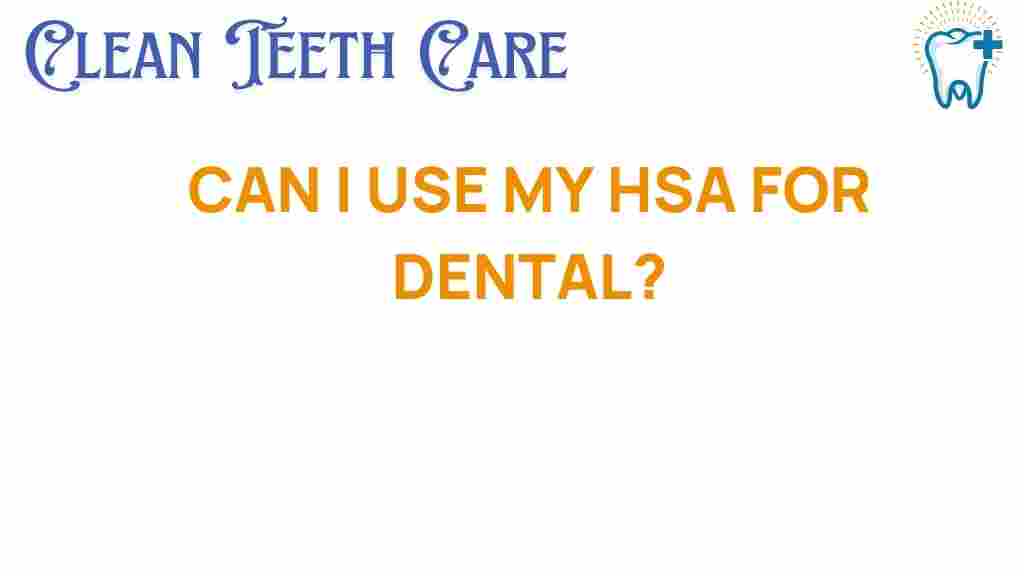Unlocking HSA Benefits: Is Dental Care Covered?
Health Savings Accounts (HSAs) are powerful financial tools that allow individuals to save for medical expenses while enjoying tax advantages. Many people are aware of the benefits of HSAs for general healthcare, but a common question arises: is dental care covered under an HSA? In this article, we’ll explore the relationship between HSAs and dental care, what expenses are eligible, and how you can maximize your HSA benefits for oral health.
Understanding HSAs and Their Benefits
A Health Savings Account (HSA) is a tax-advantaged savings account designed to help individuals save for qualified medical expenses. Here are the key benefits of using an HSA:
- Tax Deductions: Contributions to your HSA are tax-deductible, reducing your taxable income.
- Tax-Free Growth: The funds in your HSA can grow tax-free, meaning you won’t pay taxes on interest or investment gains.
- Tax-Free Withdrawals: Withdrawals for qualified medical expenses, including some dental care, are tax-free.
- Portability: HSAs are owned by the individual, not the employer, making them portable across jobs.
What Dental Care Expenses Are Covered by HSA?
When it comes to dental care, HSAs can be a great resource for financing various oral health expenses. However, not all dental services are covered. Here’s a breakdown of eligible and ineligible expenses:
Eligible Dental Expenses
The following dental care expenses can typically be paid for with HSA funds:
- Preventive care (cleanings, exams, x-rays)
- Fillings and crowns
- Root canals
- Orthodontics (braces)
- Periodontal treatments
- Dental surgery
Ineligible Dental Expenses
While many dental expenses are covered, there are some that are not eligible for HSA reimbursement:
- Cosmetic procedures (teeth whitening, veneers)
- Toothbrushes and toothpaste
- Dental care not deemed medically necessary
How to Use Your HSA for Dental Care Expenses
Using your HSA to finance dental care is a straightforward process. Follow these steps to ensure that you properly utilize your funds:
Step 1: Confirm Eligibility
Before scheduling a dental procedure, check if the service is eligible under IRS guidelines. Refer to the IRS publication on qualified medical expenses for a comprehensive list.
Step 2: Fund Your HSA
Ensure that your HSA has sufficient funds to cover your dental expenses. You can contribute to your HSA through payroll deductions or make direct contributions.
Step 3: Pay for Dental Services
When you visit the dentist, you can either pay directly with your HSA debit card or submit for reimbursement later. Ensure that you keep the receipts as proof of payment.
Step 4: Keep Records
Maintain detailed records of all dental expenses paid from your HSA. This documentation is crucial for tax purposes and verification in case of an audit.
Common Questions About HSA and Dental Care
No, HSA funds cannot be used to pay for dental insurance premiums. However, you can use your HSA for out-of-pocket dental expenses that are covered by your insurance.
What happens if I use HSA funds for ineligible expenses?
If you use HSA funds for non-qualified expenses, you’ll be subject to income tax on that amount, along with an additional 20% penalty if you are under age 65.
Can I use my HSA for dental expenses after retirement?
Yes, after age 65, you can use HSA funds for any purpose without penalty, although you will owe income tax on non-qualified withdrawals.
Troubleshooting Common Issues
While HSAs can simplify the financing of dental care, you may encounter some common issues:
Issue 1: Denied Claims
If your claim for dental expenses is denied, review the eligibility criteria. Ensure that the service was medically necessary and check with your dentist for billing errors.
Issue 2: Insufficient Funds
If you find your HSA balance is low, plan future contributions to avoid running out of funds. You can contribute up to the annual limit set by the IRS.
Issue 3: Lack of Documentation
Always keep receipts and statements for your dental expenses. If you lose documentation, contact your dental office for duplicates.
Conclusion
Unlocking the benefits of your Health Savings Account for dental care can lead to significant savings and improved oral health. By understanding what dental expenses are covered, following the correct procedures for using your HSA, and being aware of common issues, you can enhance your financing strategy for dental care. To maximize your HSA benefits, make sure to regularly monitor your expenses and stay informed about eligible services. For more information about managing your health savings account, consider visiting resources for HSA management.
In summary, HSAs offer a valuable way to manage your dental care expenses effectively. With careful planning, you can enjoy significant financial advantages while taking good care of your oral health.
This article is in the category Treatments and created by CleanTeethCare Team
